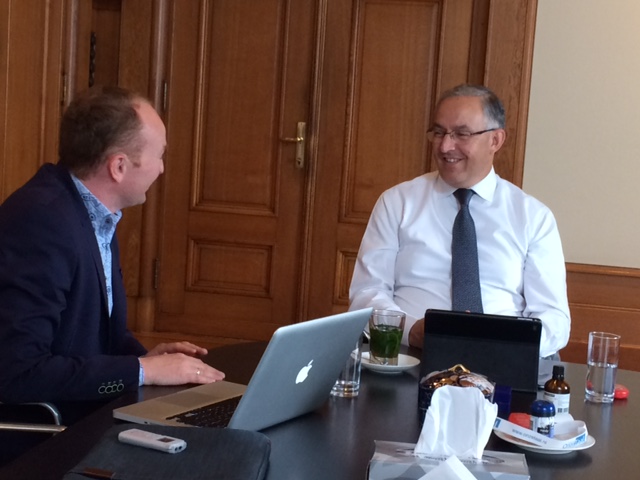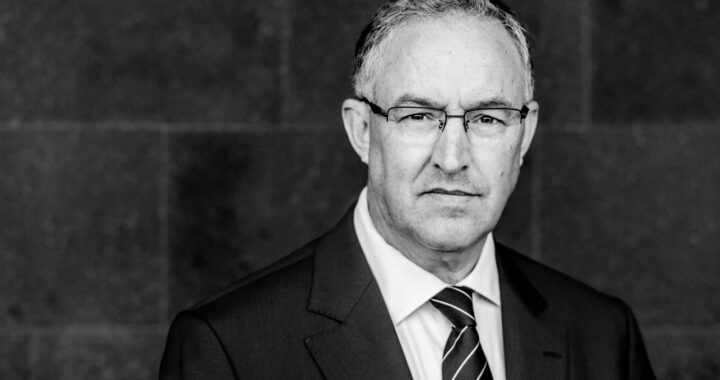Ahmed Aboutaleb announced that he will soon step down as mayor of Rotterdam. In 2021, he was recognized as the best mayor in the world. “Aboutaleb has led Rotterdam since 2009 with courage, patience, and humility. He is referred to by most as the ‘father of the city.’ Throughout his years as mayor, he has acted like the father of a large family,” according to the jury’s report.
“Many politicians speak about poverty without having experienced it themselves,” he says in his office at City Hall. “That doesn’t apply to me. A poet once said: ‘If poverty were a man, I would have killed him.’ You only kill your greatest enemy. When I was suffering from poverty myself, I didn’t think of it in that way, but I did experience it as a great injustice. I thought: what have I done wrong to deserve this misery? Why do others in the village have a TV, a car, and meat every day, and we don’t? We didn’t even have electricity.”
Going to bed hungry
The life story of Ahmed Aboutaleb may seem like a success story. He grew up in a small village in Morocco, walked barefoot, and sometimes went to bed hungry. After moving to the Netherlands at the age of 15, he worked hard to secure important positions in society. Most notably, he served as an alderman in Amsterdam (“an internship to later become mayor of Rotterdam,” he once joked about that period), State Secretary for Social Affairs & Employment, and since 2009, mayor of Rotterdam. But this path has cost him, he says over a cup of tea. “I studied and worked hard to escape poverty. But because of that, I skipped a part of my youth and became an adult too soon. I didn’t play, go out, or have fun during my youth.”
“One of my children once said to me: ‘Dad, I wouldn’t want to live the way you did.’ But I don’t expect that from anyone. Besides, you need a bit of luck and to meet kind people along the way. For example, in The Hague, where I lived, I received free Dutch lessons from a church group. I also attended evening classes in other neighborhoods. Technically, I wasn’t allowed to, but I wanted to learn Dutch quickly.
In Morocco, I was the goalkeeper for our village football team. In the Netherlands, I fell in love with cycling. As a student, I bought a bike with my first hard-earned savings. When it was stolen, I was furious! As a journalist in radio and TV, I worked a lot and exercised little. I often ate fast food from gas stations along the highway. During those years, I gained a lot of weight. I only started exercising again when my GP told me I really had to make some changes.”
What were the symptoms?
“It started with a painful cervical vertebra, causing shooting pains in my back, as if a knife were being thrust into it. Even with a heavy dose of paracetamol, I couldn’t sleep. My belly was also in the way; I couldn’t even reach my shoelaces. I went to a gym and got help from a fitness coach. I lost 25 kilos. Now I also run and power walk.”
Inhale, exhale
In his free time, Aboutaleb enjoys running in various parts of the city. It takes him about an hour and a half to run 10 kilometers, he says. While running, he listens to sung poetry or recited Quranic verses. “The rhythm helps balance your breathing. Inhale, exhale. Listening to the poetic beauty forces you not to think about work. It also strengthens my core muscles. I also try to eat healthy.”
So,You don’t stop at the neighbor of City Hall, the McDonalds?
“No, I don’t snack anymore, and I avoid bread, rice, and sugar as much as possible. For lunch, I eat salad. I use olive oil and honey. At formal occasions, I skip the cake. I don’t drink or smoke. Because I sit a lot, I really have to make sure I burn fat through exercise. I plan to run to City Hall from time to time instead of using the official car. I can shower here and change into my formal suit.”
“I shop consciously, so I don’t buy unhealthy things like chocolate. We don’t eat that at home either. I go to the supermarket myself because, as mayor, I want to know what people are paying for their groceries. I don’t have to worry about the prices, but I want to know how much a liter of milk or a loaf of bread costs.”
And?
“At the end of the day, bread is often discounted to around 90 cents. However, I don’t eat supermarket bread myself because of the additives that make it last longer. I buy bread from a Moroccan bakery made of flour, salt, barley, and water. The downside is that you have to eat it fresh. Unless, of course, you toast it. As it happens, we love toasted bread at home.”
It all sounds healthy, but not all Rotterdammers can afford a gym or healthy food.
“I know. I have family members who only make it through the month with the help of other family members. But as mayor, I can help Rotterdammers in financial need. I’m the patron of the Special Needs Fund. I once received a letter from a woman who couldn’t afford her children’s schoolbooks. The fund helped her financially. I read letters like this because, as mayor, I want to know what’s going on among the people. This was also the case when many evictions were threatened in a neighborhood because water bills hadn’t been paid. The bailiff asked me for police support. I believe that mayors should not only make legal decisions in such moments but also ethical ones. That’s why I first wanted to know: why can’t these people pay the bills? City employees visited homes and found much suffering behind the doors. A mother with a newborn baby… How can she care for her child without water? You don’t evict such a woman. We were able to refer her and many others to social services so they could stay in their homes. Only a small number of non-payers had to be evicted. I would feel terribly guilty if we hadn’t made such checks.”

Mayor Aboutaleb in conversation with journalist Sjoerd Wielenga.
What do you think about the social climate in the city? Do people look out for each other enough?
“Prime Minister Rutte once criticized the ‘me-first mentality’ in the Netherlands: people who are selfishly only focused on themselves. I found that a strange argument. That ‘me-first’ mentality does exist in the Netherlands, but there is also so much warmth in society. We are very good at criticizing each other and focusing on things that don’t go well. But I notice a lot of warmth in society, and we must keep reminding each other of that. I recently opened a church organization in Rotterdam. It’s a social institution that helps people struggling with issues like poverty and domestic violence. Or think of caregivers who provide end-of-life care for strangers. There are many people who help others. Opposite the ‘me-first’ is a lot of ‘we’: people who care for each other.”
Aboutaleb recalls a woman who made a deep impression on him. He spoke to her after an over-50s housing complex in IJsselmonde had burned down and residents had to be evacuated. Red Cross emergency volunteers helped, including this woman. “A few days later, I received an email from a man telling me that this woman had been cut off from gas and electricity because she couldn’t afford to pay the bills. She was there doing volunteer work, but she hadn’t said a word about her own situation. The man asked if I could help her. We did. This woman had major problems of her own, but she was helping others. I find that so special!”
If you have little money, you should try to find a job, according to the city council, which Aboutaleb chairs. But reintegration into the labor market isn’t just about finding work, he says; it’s also about physical activity. “People in poverty are often stressed, take medication, and are often overweight. Out of shame, they don’t go out much and become isolated. I wonder: how can we encourage them to move more? People shouldn’t just participate in the labor market but also move physically. It makes them healthier, helps them reintegrate more easily, and they meet others again. I think this is an important issue that deserves political attention. Church groups could play a role in offering such a movement program.”
This article by journalist Sjoerd Wielenga previously appeared in the Rotterdam magazine Sjaak.

